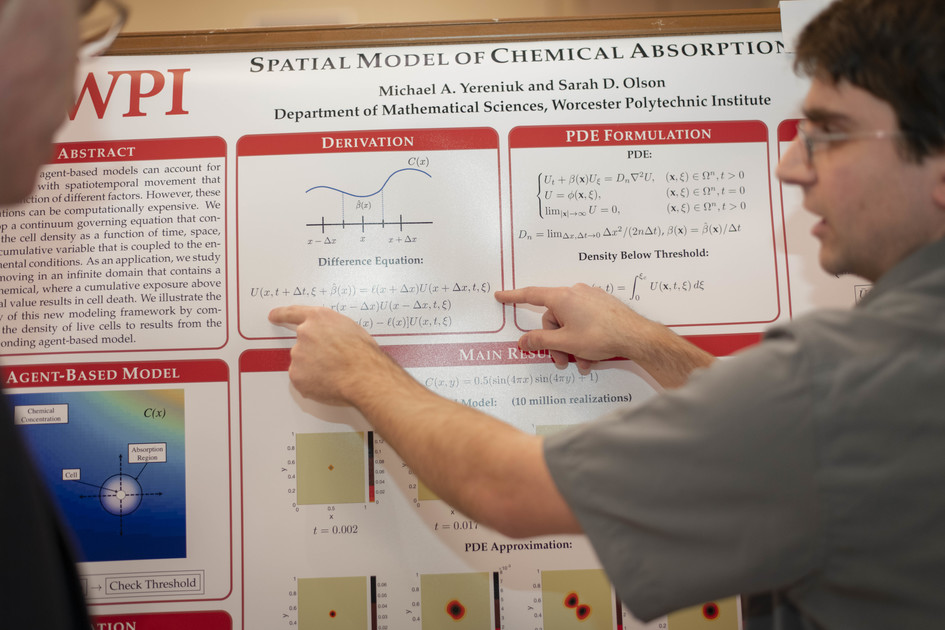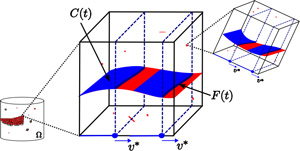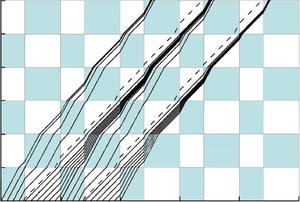Research
Research in the Mathematical Sciences department at WPI plays a vital role toward solving complex problems facing our world today. Many of our research areas are internationally recognized, with grants and awards coming from the National Science Foundation, the National Institutes of Health, the National Security Agency, and several corporations.
For other noteworthy activities of our faculty and students please visit our Highlights page.

Mathematical Sciences Research Seminars
The WPI Mathematical Sciences Department hosts several research seminar series. We invite you to take a look at what seminars are currently scheduled. For further information regarding Mathematical Sciences seminars please contact the main office at 508-831-5241 or ma-questions@wpi.edu.
The Mathematical Sciences faculty members are currently involved in a wealth of distinct research projects, both fundamental and applied:
Algebra/Discrete Mathematics
Coons, J., Fehribach, J., Humi, M., Martin, W., Servatius, B., Tripp, S.,
- Cryptography
- Discrete Geometry
- Graph Theory and Combinatorics
- Group Theory
- Linear Algebra
- Matroids
- Symmetry and Lie Groups
Analysis
Fehribach, J., Lam, Hy., Larsen, C., Lurie, K., Peng, G., Vernescu, B., Volkov, D.
- Calculus of Variations
- Nonlocal Models
- Partial Differential Equations
Applied Mathematics
Arnold, A., Bernardi, F., Blais, M., Fehribach, J., Ferranti, D., Gu, B., Humi, M., Lam, Hy., Larsen, C.,Lurie, K., Nachbin, A., Olalaranont, O., Olson, S., Peng, G., Sarkis, M., Servatius, B., Song, Q., Sturm, S., Tang, D., Tilley, B., Wang, F., Vernescu, B., Volkov, D., Walcott, S., Wu, M., Zhang, Z.
Post-Doctoral Scholars: Chakroborty, S., Liu, S.,
- Fluids
- Computational Biofluid
- Energy-Fluid-Chemical Transport Through Porous Media
- Interfacial Phenomena of Fluid Mechanics
- Microfluidics
- Water Waves
- Mathematical Biology
- Biomechanics
- Computational Bioengineering
- Image-Based Modeling for Vulnerable Plaques
- Image-Based Ventricle Models
- Mathematics of Materials Science
- Defect Evolution
- Defect Structure
- Dynamic Materials
- Geothermal Energy Harvesting
- Optimal Material Design
- Porous Electrodes
- Soft Biological Tissue
- Mathematical Physics
- Numerical Analysis/Computational Modeling
- Domain Decomposition
- Finite Element Methods
- Multigrid Methods
- Numerical Methods
- Scientific Computing
- Probability and Stochastic Analysis
Financial Mathematics
Blais, M., Song, Q., Sturm, S., Wang, F., Wang, G., Zhang, Z.
- Computational Finance
- Mean Field Games
- Option Pricing and Hedging
- Portfolio Selection and Investment
- Systemic Risk
Statistics
Fowler, C., Lam, Hy., Nandram, B., Paffenroth, R., Peiris, B., Sales, A., Wang, F., Wu, Z.,
Post-Doctoral Scholars: Chakroborty, S.,
- Biostatistics and Bioinformatics
- Biosurveillance and Spatio-temporal Statistics
- Compressed Sensing
- Causal Inference
- Missing Data
- Network Analysis
- Time series and Financial Statistics
- Unsupervised Machine Learning

Predicting Cracks in Materials
Christopher Larsen studies applied analysis and materials science. Currently, he is captivated by research in the field of fracture mechanics, particularly predicting crack sets in physical materials.

Breathing New Life into Materials
Having pioneered the field of optimal material design, Konstantin Lurie is shaking up the materials world again. He wants the world to begin to think of materials in a new way. Instead of substances with constant properties, he has shown that materials can be entities whose properties can change—in space as well as time.
Computational Biology
Modeling frameworks can be utilized to understand, predict, and control many biophysical processes. Sarah Olson works at the intersection of Applied and Computational Mathematics to develop, analyze, and simulate new models to test hypotheses and understand emergent phenomena in biological systems.
Machine Learning
Machine learning impacts may aspects of our lives, from shopping and social media to AI assistants and gaming, but the mathematical theory of many such algorithms is not well understood. Randy Paffenroth works at the intersection of Mathematical Sciences, Computer Science, and Data Science to better understand and improve these ubiquitous algorithms.
Inverse Problems and Data-Informed Prediction
Dr Andrea Arnold "Inverse Problems and Data-Informed Prediction"
Using Matroid and Graph Theory for Various Applications
Brigitte Servatius is a discrete, or finite, mathematician, and her major tools are matroid and graph theory. Matroid theory is essential in developing and speeding up algorithms that are used to power the Internet and implement GPS tracking technology, among other applications.